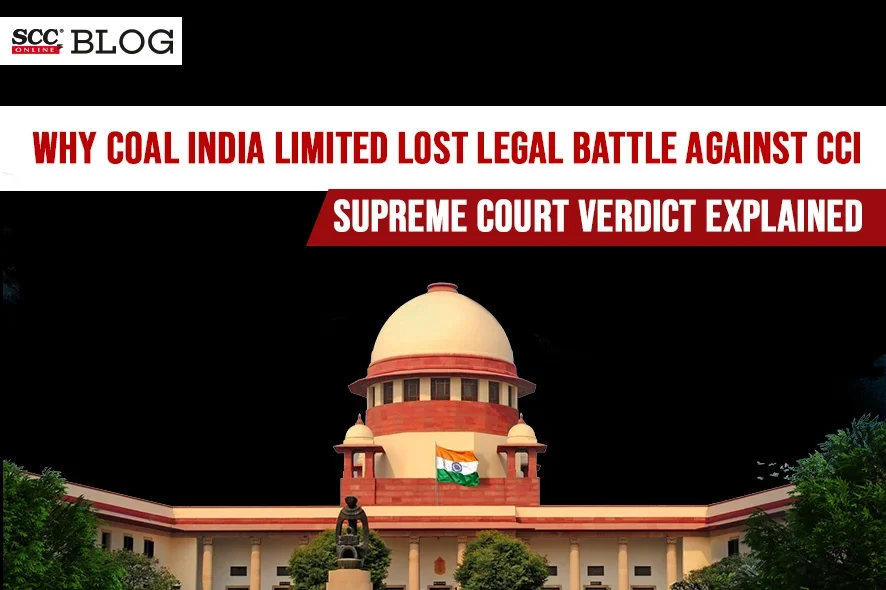Supreme Court: In a case where Coal India Limited and its subsidiary Western Coalfields Limited had contended that they cannot be bound by the Competition Act, 2002 as both are governed by the Coal Mines (Nationalization) Act, 1973, the 3-judge bench of KM Joseph*, BV Nagarathna and Ahsanuddin Amanullah, JJ has rejected the contention and observed that,
“If Parliament has intended that State monopolies even if it be in the matter of distribution must come under the anvil of the new economic regime, it cannot be found flawed by the Court on the ground that subjecting the State monopoly would detract from the common good which the earlier Nationalisation Act when it was enacted, undoubtedly, succeeded in subserving. We see no reason to hold that a State Monopoly being run through the medium of a Government Company, even for attaining the goals in the Directive Principles, will go outside the purview of the Act.”
It was argued by the appellants that applying the Competition Act to the Monopolies would produce such anomalous results as would stultify the sublime goal enshrined in Article 39(b) of the Constitution as also Nationalisation Act.
While the Court agreed with the contention that the actions of the appellants can be challenged in proceedings in judicial review and that there may be forums other than the Competition Commission of India (CCI) such as the Controller of Coal whereunder redress may be sought against action of the appellants, it, however, held that such remedy by itself, cannot result in denial of access to a party complaining of contravention of a law which is otherwise applicable. “It must also be remembered that action can also be taken by the CCI suo motu. Such is the width of the power vouchsafed for the authority under the Competition Act.”
The Court also clarified that it is open to the appellant as the State monopoly to take up all contentions to demonstrate that there is no abuse of the dominant position. Be it differential pricing or a decision to limit or restrict production, if it is part of national policy or based on Presidential Directives and the appellant raises such a contention after bonafide following the Directives or policy themselves, it may be a matter, which the CCI would have to consider in deciding whether there is abuse of dominant position.
The Court explained that Section 19(4) in fact, empowers the CCI to have regard to “all” or “any” of the factors to arrive at the finding that an enterprise enjoys a dominant position or not. Section 19(4)(g) declares that “monopoly” or “dominant position”, whether acquired as a result of the Statute or by virtue of being a Government Company or a Public Sector Undertaking or otherwise, is to be a relevant factor. Hence, this is a clear indication that far from excluding governmental bodies like a government company, a public sector undertaking or a body under a Statute from the purview of the Act, the lawgiver has evinced its intention to include government companies, public sector companies and bodies acquired under a Statute within the ambit of the Act.
Government Departments are also expressly covered within the expression ‘enterprise' under the Act. No doubt, Departments discharging sovereign functions are excluded but save those Government departments which are excluded, the Government Departments being State, are equally obliged to bear in mind the Directive Principles. The radical nature of the law contained in the Act has made a perceptible departure from the erstwhile law contained in the MRTP Act.
The Court explained that what is excluded from the definition of the expression ‘enterprise', is a Government Department carrying on Government functions. Hence, carrying on business in mining, cannot, by any stretch of imagination, be described as a sovereign function. There is nothing in the definition which excludes a State monopoly which is even set up to achieve the goals in Article 39(b) of the Constitution.
“It would involve elevating the appellants to a status above that of a Government Department to approve of the argument that Article 39(b), would allow the appellants to resist action under the Act, when it does not allow the Government Department, under which, in fact, the appellants operate to do so.”
Holding that the appellants cannot resist the imposition of standards of fairness and the duty to avoid discriminatory practices when a specialized forum has been created by Parliament under the Act where also apart from the CCI being an expert body, it can seek and receive valuable inputs from experts and what is more, the matter is preceded by the report of Director General of Investigation, the Court also stated that,
“The Competition Act cannot result in transforming the appellants into mere profit-making engines or require of them to be oblivious to their obligations under the Constitution. But that cannot equally mean that they can act with caprice, or unfairly or treat otherwise similarly situated persons or things with discrimination.”
[Coal India Limited v. Competition Commission of India, 2023 SCC OnLine SC 740, decided on 15-06-2023]
*Judgment Authored by Justice KM Joseph
Advocates who appeared in this case :
For Appellants: Senior Advocates K.K. Venugopal and Maninder Singh and Advocate Yaman Verma, For CCI: ASG N. Venkataraman
For Second Respondent: Senior Advocate Ranjit Kumar






